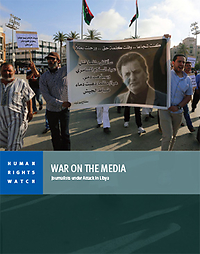By Libya Herald staff.

Malta, 10 February 2015:
In its latest report on the media in Libya, Human Rights Watch (HRW) has characterized . . .[restrict]the situation in Libya as a ‘’war on the media’’, with ‘’journalists under attack’’.
‘’Militias have attacked media headquarters and homes of journalists and forced several journalists and media professionals to flee the country’’, the report says. There have been ‘’attacks against journalists and the offices and facilities of media outlets since the 2011 uprising, including threats, assaults, kidnappings, and killings’’, adding that the weak Libyan government has failed ‘’to protect journalists and the media, and hold perpetrators of attacks on them accountable’’.
The report said that the ‘’revolution that toppled Muammar Qaddafi’s dictatorship in 2011 following a popular uprising and civil war, transformed Libya’s media landscape. Libyan journalists started to report the news, express opinions, and criticize politicians like never before’’.
‘’In the first year after the 2011 uprising’’, the report added, ‘’private newspapers and magazines proliferated in a climate of newly found freedom. The number of Libyan satellite TV stations broadcasting from inside and outside Libya increased from two at the end of the Gaddafi era to more than 50’’.
‘’The number of publications rose from four daily newspapers and a few specialized publications to dozens of publications. Suddenly journalists were publicly debating substantive political issues that hitherto few had dared to discuss even in whispers’’, the report said
However, it noted that ‘’this flourishing media now finds its new freedoms under threat as heavily armed militias have brought the post-Qaddafi state to its knees. Key institutions, including the judiciary, police and army, have collapsed in some major cities including Benghazi and Derna’’, it concluded.
‘’Officials are powerless to maintain security, or to apprehend or prosecute those who commit crimes, including murders and assassinations. Militia members have benefited from near immunity against prosecution since 2011, and very few cases have gone to court’’, the report noted..
The impact of the deteriorating political and security situation on Libya’s media has been profound. The media landscape has become polarized, chaotic, politicized, and violent.
‘’Human Rights Watch is not aware of a single instance in which officials prosecuted a perpetrator of an attack against a journalist or media outlet since 2011’’, whereas ‘’criminal prosecutions of journalists for defamation and libel, on the basis of problematic laws that continue to unduly restrict freedom of expression’’, existed.
The report says that ‘’between mid-2012 and November 2014, Human Rights Watch documented at least 91 cases of threats and assaults against journalists, including against at least 14 female journalists and media workers’’.
‘’This figure includes 30 cases of kidnappings or short-term arbitrary detentions of journalists, mainly by militias, and eight killings of reporters. In a few cases, the journalists may have been unintentionally injured or killed while reporting on violent incidents’’.
‘’But in most cases documented by Human Rights Watch it was clear that armed groups targeted journalists to punish or censor their reporting. In the same period at least ten journalists fled the country after being attacked or threatened. Human Rights Watch also documented 26 cases of armed attacks against the offices of television and radio stations’’, the report said.
The report also noted that Libyan ‘’journalists also continue to face legal hazards not only because sweeping Qaddafi-era laws restricting press freedom have not been repealed but also on account of newer laws restricting freedom of expression promulgated by Libya’s interim authorities since the end of 2011. Prosecutors have pressed criminal charges against journalists and civilians have pursued lawsuits against them for slander, insult, and libel’’.
‘’Journalists have not been immune from the violence as militias have attacked media headquarters and homes of journalists and forced several journalists and media professionals to flee the country’
The report called on ‘’Legislators, particularly members of a future permanent parliament, to repeal articles of the Libyan Penal Code and other laws that provide criminal penalties for defamation and insults to religion and ensure that all laws that impact free expression retain only those limitations that are necessary and proportionate’’.
‘’Members of the Constitution Drafting Assembly (CDA) have a historical opportunity to enshrine a strong protection of human rights, including freedom of expression, in the draft constitution to ensure that speech cannot be criminalized in future legislation’’, the report added.
‘’The elected government of Libya as well as non-state actors and members of militias are bound by international law obligations to protect journalists, as much as they are bound to protect civilians, during armed conflicts’’ the report reminded.
‘’Human Rights Council member states need to ensure that an international investigative mechanism is established to document serious human rights violations including those that may amount to war crimes and crimes against humanity, such as politically motivated assassinations and attacks on journalists, in view of the Libyan judiciary’s limited ability to conduct investigations and prosecute perpetrators’’, the report demanded.
‘’Members of the International Criminal Court (ICC) and the UN Security Council, which unanimously referred the Libya situation to the court in 2011, should ensure that the ICC has sufficient resources and support to be in a position to pursue investigations into ongoing serious crimes’’, the report said. [/restrict]







